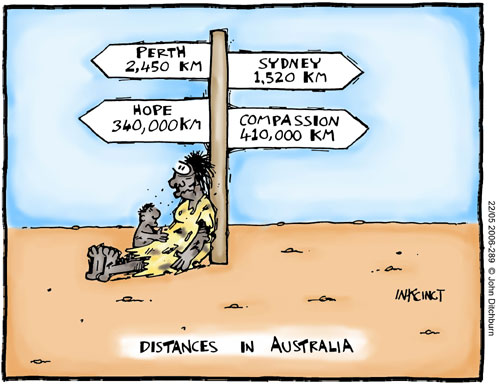|
July 2, 2006
Jodi Dean, who runs the I Cite weblog, has a brief post on Theory Blogging --its about blogs and scholarship in the academy. There are some comments on the post by McKenzie Wark, an Australian postmodern scholar who now lives in New York. Wark, the author of The Hacker Manifesto, says:
I'm also skeptical about its [blogging] value for scholars, particularly young ones. It may stimulate a tendency to groupthink, and an addiction to a certain temporality for thought. How is one to think in an untimely fashion with a constant hum of day-to-day discourse going on in the background?
Well, an engagement for those in Australia with the issue raised by the cartoon would be untimely. It sure would avoid the group think:

John Ditchburn
Professor Boni Robertson, author of the Women's Task Force on Violence report in 1999, which revealed a horrific level of violence in Aboriginal communities in Queensland, told The Australian.
"Enough is enough. Aboriginal Australia right now is in a position of fear and uncertainty. People don't know where we're heading - there is just this blame, blame, blame. That doesn't mean to say we shouldn't do something about the violence and the substance abuse. Nobody wants to see a child hurt or violated. But there has to be a more productive, pro-active way of dealing with it than having to resort to those antiquated solutions that have proven time and time again not to have worked...The violence is terrible, but our people have been saying it's been there for years and years and years. The only thing that's changing is that the consequences of the violence is getting worse and the causes of the violence is getting worse - impoverishment is getting worse in our communities.
The federal Government is conducting a law-and-order campaign whilst not focusing on the causes of the violence - poverty, disempowerment and alcoholism.Of course, an engagement with such an issue requires some theory if we are in Wark's words, to 'hack the new out of the old.' How would theory blogging help 'create the possibility of new things entering the world.'?
Jodi has an article in Bad Subjects entitled Blogging Theory She writes:
At any rate, missing from nearly every account of blogs and blogging is the genre of academic blogs, and its even smaller subset, the theory-minded blog--no doubt because the number of such blogs and their readers is small and their discussions specialized if not downright esoteric--Badiou, Benjamin, Blanchot, Heidegger, Zizek.The theory blogs---and I am thinking primarily of about thirty or so interconnected blogs---generally combine personal and theoretical explorations, discussions of culture and politics, reflections on academic practices, and anything that strikes the blogger’s fancy.
There are very few of these theory weblogs in Australia. Some are written by younger academics.
Jodi adds that whilst these theory blogs share a thread of theoretical concerns, they also differ greatly:
The authors might be single or groups. They might or might not allow comments. They might post daily or less than once a week. Their tones and personalities differ. Some blogs are playful, filled with rough and tumble banter. Others feel a bit like a seminar or like meeting up in a restaurant or bar after the seminar has ended in order to continue the discussion. Still others have the feel of reflections, notes, and drafts, moments of thought and writing usually more private and isolated now open to those who might want to consider them, who might have a suggestion or two. I think of notebooks left open for other’s marginalia.
Philosophical conversations is more notes and moments of thought, an oneline notebook almost.
Jodi then adds that what is particularly remarkable is the way these differing blogs interact in terms of an ongoing conversation;
conversations moving from one site to another or taking place on several sites at once, conversations branching into differing sets of links, never encompassing them all, but rarely limited to one. So, some of the same people appear in various conversations, although not all of the same people will comment at each blog. What the theory blogs suggest, then, is a practice of blogging that is more than journalism, more than diary keeping, and more than remediation. Ours is a practice of critical conversation beyond and through existing institutional frameworks.
Yes.
|
|

Ciriticism of Zizek
http://zlomislic.blogspot.com/2006/07/to-beyond-lacan-and-zizeks_115383870544492449.html